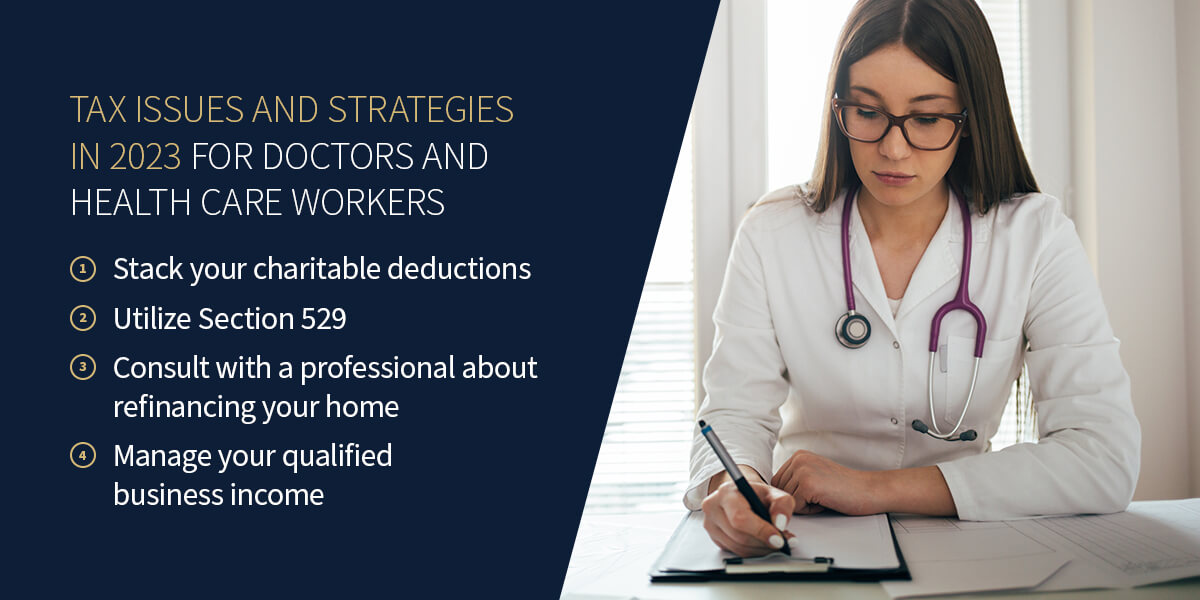As a doctor or other health care professional, you've certainly worked hard to achieve your income. Running a medical practice or moving up the ranks from a resident to an attending may have allowed you to pursue many life goals, such as buying a home for your family, paying off your debt or investing in real estate. However, higher income also usually implies significant tax obligations.
To avoid paying high-income taxes, it's important to learn about the various ways you can pay less income tax through tax deductions, credits and exemptions that the Internal Revenue Service (IRS) already allows. With the help of the right professionals, you can reap the benefits of the tax code by learning the right tax-saving strategies for physicians and other health care workers.
Why Tax Planning Is Important
Planning ahead for your taxes can be a challenge with your busy schedule. As a result, many physicians and healthcare professionals continue to work as usual, thinking they can simply deal with their taxes when it becomes that time of the year. This can lead to a hefty tax bill and unnecessary losses to your savings, investments and assets. If you are in a particularly high tax bracket, you could be wasting thousands of dollars on taxes without proper planning and use of deductions.
For some medical professionals, this could mean up to a third of your pay goes straight to taxes. If you also own a home, several vehicles or a growing medical practice, any debt from these expenses can also eat away at your income. Having a solid tax and financial plan can help you remain in control of what you've earned, letting you put more money into your retirement plan or children's education.
As a physician, consider how much you plan ahead for a surgery or how many years you spent in education to achieve your degrees. When it comes to tax season, this type of planning ahead and preparation is just as important to protect your hard-earned income.
For example, perhaps you've been thinking of setting aside money for an extended family vacation or making a large donation to a charity you feel strongly about. Proper tax planning helps you meet these goals by determining the least taxable path going forward. Relying on experienced, knowledgeable professionals to analyze your financial situation can minimize your tax liability and keep more money in your pocket.
Deductions Relative to Doctors and Health Care Workers
Part of tax-saving strategies for health care workers and doctors is understanding the ways you can reduce your taxable income with deductions. Here are some common physician tax deductions you may not know about:
- Contributions to retirement plans: Contributing to a 401(k), 403(b), 457 plan or a traditional IRA may be tax-deductible. However, some physicians may not be able to deduct their IRA contributions depending on their income thresholds and whether they have access to a group retirement plan.
- Home office and expenses: If you provide services out of your home, including administrative duties, you may be eligible to deduct some of your home's expenses, such as real estate taxes, utilities, repairs and mortgage interest. Be sure to track expenses for things you buy and repair for business uses in your home.
- Mileage: If you have a home office or often travel to different locations, such as to clinics and hospitals, you can deduct the mileage. You can use certain GPS apps to produce reports that show the mileage of your business travel, including going to and from business meetings or meals, for tax preparation purposes.
- Charitable donations: Most qualified charitable distributions (QCDs) can reduce your income tax. There are various strategies you can use to maximize your charitable contributions, such as donating low-cost basis stock. You can also donate securities from your taxable accounts to gain a double tax benefit.
- Health Savings Account: Contributions to a Health Savings Account (HSA) are tax-deductible and an efficient way to save. HSA contributions are also tax-free and grow tax-free. You can even withdraw tax-free if you use the funds for qualified medical expenses under the age of 65. It's important to note that you can pay for medical expenses out of pocket and keep the receipts until you take money out of your HSA, helping funds grow more quickly.
- Student loan and continuing education expenses: Many physicians carry heavy debt from student loans or continuing education expenses. You may be able to deduct the costs of your continued education expenses and interest paid on student loans.
- Self-employment tax deduction: Physicians who work for themselves have to pay a self-employment tax. While this cannot be eliminated altogether, you can often reduce this tax liability if you set up your medical practice as an S corporation, in which any income or losses are generally taxed at the entity level.
- Business expenses: If you run your own practice, you can deduct the expenses necessary and ordinary for your business. These expenses can include equipment, supplies, uniforms and travel expenses.
- Malpractice insurance: The cost of malpractice insurance may be deductible as a medical expense.
Tax Issues and Strategies in 2023 for Doctors and Health Care Workers

There are certain tax inflation adjustments and changes to federal tax brackets in 2023, so it's important to know what you can do to minimize your tax liability this year when you file in 2024. Here are some tax-saving strategies for doctors to keep in mind:
- Stack your charitable deductions: The standard deduction in 2023 has increased to $27,700 for married couples filing jointly, which means you may not be able to benefit from making relatively small donations to charity. To avoid this issue, consider contributing appreciated securities to a donor-advised fund or making one large donation every other year. With a larger tax break this year, you can still make smaller charitable gifts
- Utilize Section 529: Under Section 529 of the new tax bill, physician families can cover the cost of private education for each of their children for up to $10,000 a year. Some states also allow tax deductions for contributions to 529 savings plans.
- Consult with a professional about refinancing your home: If your mortgage originates before December 2017, you may only deduct the interest on the first $750,000. If you decide to refinance your home and end up with a greater balance than this, it's best to consult with a professional about alternative tax strategies.
- Manage your qualified business income: If you set up your practice as an S-corp, sole proprietorship, partnership or other pass-through entities as a self-employed business owner, it's important to discuss your qualified business income (QBI) with a tax specialist early in the year to work through these complicated tax rules.
ROAs and Investment Strategies
Here are some alternative investment options and ways you can protect your gross income and make tax season a little easier in the future.
- Determine your return on assets: Calculating your return on assets (ROAs) can help you determine the profitability of your practice in relation to your total assets. This metric will identify how well your practice is performing by comparing your net income to the capital you invest in the assets. You can use ROA to understand how well you are utilizing your resources when it comes to tax implications and can help you protect your assets.
- Move to a state with no income tax: While this is not a realistic option for everyone, consider whether you and your family might want to move to a state that does not levy personal income tax, such as Florida, Texas, Washington, South Dakota or Tennessee. These states do not tax wages, but they do tax investment income and interest.
- Utilize cost segregation studies: If you happen to own the building where you conduct your medical practice, you can use a cost segregation study to break down your building's assets into certain classifications and depreciation timelines for tax reasons.
- Own real estate: If you have the time and money to invest in real estate, you can potentially achieve better cash flow while deducting expenses related to owning the property to offset your high income. Some of these deductions include management fees, maintenance and repairs, such as if you were to buy a rental property. Other tax deduction opportunities applying to real estate investments include depreciation costs over time, property taxes incurred and utilizing incentive programs.
Contact Bangerter Financial to Learn More
Being a physician or other high-income health care professional comes with many tax responsibilities. The more you plan, the more you can avoid wasting thousands of dollars every year on taxes and implement efficient tax-saving and investment strategies that help you achieve your goals for yourself and your family. At Bangerter Financial, it's our goal to help individuals with a high net worth like yourself learn more about alternative tax strategies in the real estate industry.
For over 40 years, our team has been helping customers find properties to invest in while providing tools to help our clients succeed in the marketplace. If you're new to real estate investing, rely on us to help you make the most of your income and avoid a hefty tax bill. Contact us today to learn more about our services, which include 1031 exchanges, alternative investments and Delaware statutory trusts (DSTs).





.png?width=273&height=103&name=Brokercheck%20(1).png)

Comments